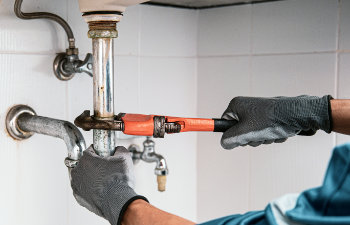
Blocked drains can quickly disrupt our daily routines and cause significant inconvenience. Understanding the common causes of drain blockages is essential for homeowners to prevent and address these issues promptly. Metro Septic reveals four frequent culprits behind drain blockages: roots in the sewer or inlet line to the septic tank, broken pipes, backpitched pipes, and grease blockages. By learning about these causes, you can take proactive measures to maintain the health of your plumbing system.
Roots in Sewer or Inlet Line to Septic Tank
One of the leading causes of drain blockages is invasive tree roots that infiltrate sewer or septic tank lines. As trees grow, their roots can penetrate pipe joints or cracks, causing blockages and potential damage. Regular maintenance, including professional inspections and root treatments, can help identify and address root intrusions before they lead to severe blockages.
Broken Pipe
A broken or cracked pipe can significantly impede the flow of wastewater and cause drain blockages. These damages may occur due to shifting soil, age-related deterioration, ground movement, or even excessive pressure. Professional plumbing assessments and repairs are crucial for fixing broken pipes and restoring the proper functioning of your drainage system.
Backpitched Pipe
A backpitched pipe refers to a pipe section that lacks the necessary slope or pitch required by plumbing codes. Without proper drainage slope, wastewater may accumulate and create blockages over time. Professional plumbers can assess the slope of your pipes and make necessary adjustments or repairs to ensure proper drainage.
Grease Blockage
Grease is a common culprit in drain blockages, especially in kitchen sinks. Over time, grease and fats solidify within the pipes, narrowing the passage for wastewater to flow freely. To prevent grease blockages, avoid pouring cooking oil or grease down the drain. Instead, collect it in a separate container and dispose of it in the trash. Regularly cleaning your drains and using enzyme-based drain cleaners can also help break down grease buildup.
Preventative Measures and Professional Assistance
To maintain a clear and efficient plumbing system, consider the following preventative measures:
- Regularly schedule professional inspections and maintenance for your septic system.
- Avoid planting large trees or shrubs near sewer lines or septic tanks.
- Be mindful of what you flush down the drains, avoiding non-biodegradable materials and excessive amounts of grease.
- Install drain traps or filters to catch debris and prevent it from entering the pipes.
If you experience persistent drain blockages or suspect underlying plumbing issues, it’s essential to seek professional assistance. Metro Septic’s experienced technicians can provide expert diagnostics, drain cleaning services, and necessary repairs to restore optimal flow and prevent future blockages.
Schedule Drain Cleaning in Metro Atlanta Today!
Understanding the common causes of drain blockages empowers homeowners to take proactive steps in maintaining their plumbing systems. By addressing roots in sewer or inlet lines, broken pipes, backpitched pipes, and grease blockages, you can keep your drains clear and avoid disruptive plumbing issues. Remember, prevention is key, and regular professional maintenance plays a vital role in the health of your drainage system.
Contact Metro Septic for professional drain cleaning, inspections, and repairs to ensure the smooth operation of your plumbing system. Our team is dedicated to providing reliable services that keep your drains flowing freely and your home running smoothly.

